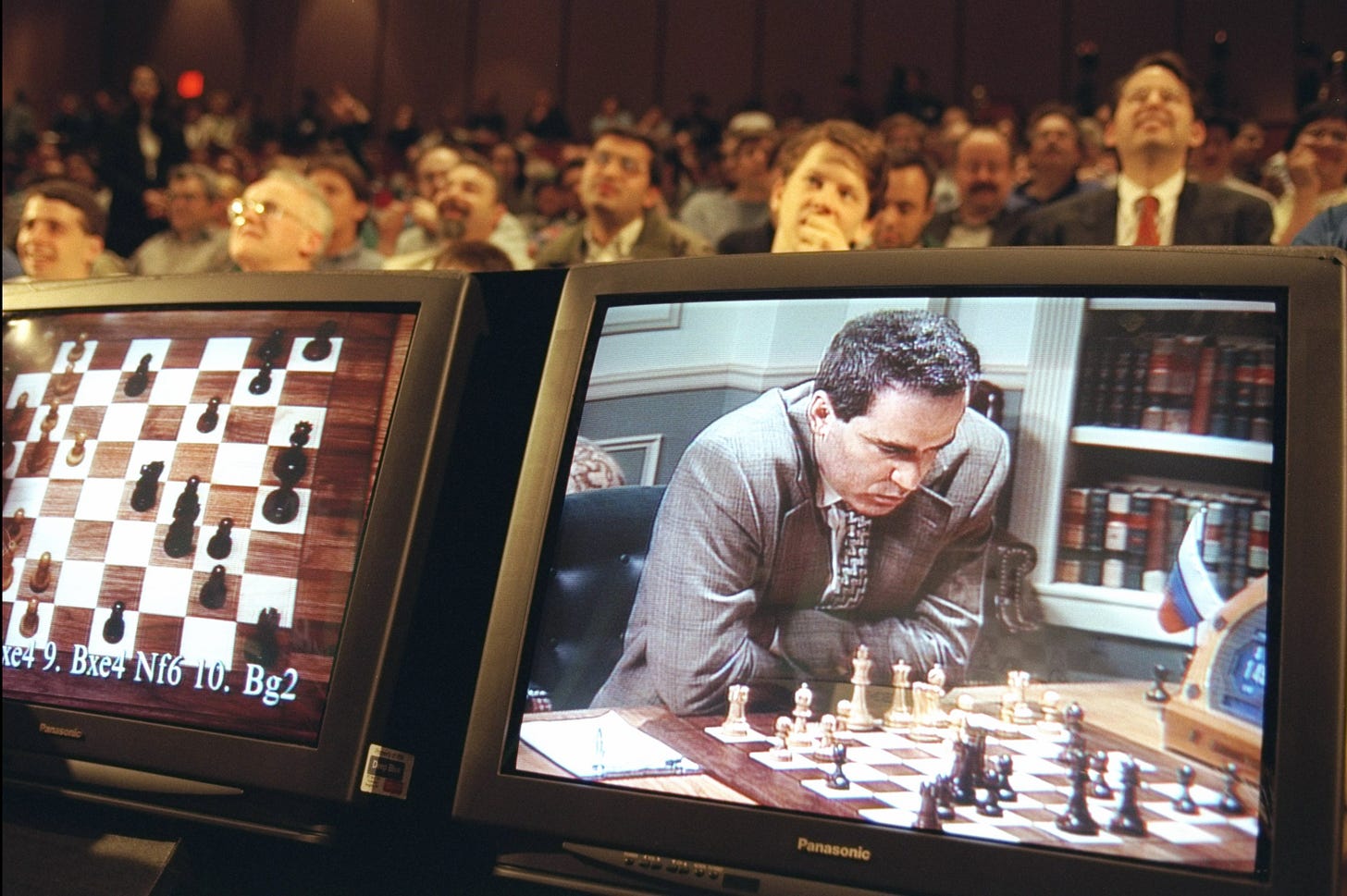
It’s easy now to forget how shocking the moment was: just after 4pm on May 11th, 1997, Garry Kasparov resigned in the final game of his highly anticipated chess match against Deep Blue, an IBM supercomputer. A machine had beaten the human world chess champion in a competitive match for the first time. Commentators used to thinking of elite-level chess as a sort of irreducibly human area of excellence—the pinnacle of our species’ intellect—were forced into a moment of humility, reconsidering the topography at the outer limits of human and machine intelligence.
Today, we’re experiencing a new moment of AI vertigo. For months now, commentators have been coming face-to-face with the shocking capabilities of a new generation of AI engines like OpenAI’s ChatGPT, and are walking away staggered, with a sickened certainty that something big is afoot, but only the haziest notion of where it might be leading. Historical parallels fail us, leaving us with a queasy sense that whatever might be about to hit us, we’re not ready.
Stepping into this haze to try to hazard a vision of the future is obviously fraught, but the moment of AI vertigo can’t last forever. As we acclimate to this weird new reality, we’re going to need mental models for what comes next. They won’t be perfect, of course. But they can cut through some of the fog, giving us at least a sense of what must change, and what won’t.
We’re living a new, much broader Deep Blue moment, when the basic boundary lines between the outer limits of what machines and humans can do are suddenly in flux. Only this time, the people directly concerned aren’t just a few dozen grandmasters in the rarified world of top-level chess. This time, it’s everyone.
All of which left me wondering: can that original Deep Blue moment inform our current vertigo?
The era of superhuman computer chess engines didn’t end high-level chess. It transformed it in fundamental and very strange ways. And the way high-level chess has changed seems to me as good a road map as any—and a surprisingly hopeful indicator—as to what comes next for all of us.
In the 26 years since Deep Blue beat Kasparov, elite chess has been revolutionized beyond recognition. A new generation of talented grandmasters has come of age in the computer era, integrating increasingly sophisticated chess engines tightly into their training. Mistakes that might have taken hours or days to ferret out in the old days are spotted by the chess engines within seconds. The resulting training routines are grueling feats of memorization, yes, but they produce human players able to perform at a nearly superhuman level.
One outcome is that the best human chess players today are, objectively, far better at chess than anyone was a generation ago. Chess, in its current form, has been around for 500 years, but none of the grandmasters of the pre-computer age could possibly compete with any of today’s elite players. The evaluation of historical players through super-computer analysis finds that the most eminent names from yesteryear’s chess—Lasker, Alekhine, Morphy among them—would not be competitive in top-level play today.
In some ways, today’s best chess players aren’t strictly human—or rather, their abilities aren’t strictly speaking human. The ranks of Magnus Carlsen (the charismatic Norwegian world champion) and his top challengers are best thought of as human-machine hybrids. They may not have access to computers as they play competitive matches, but they have what amounts to the same thing: insights, strategies and routines that they could only have gotten from a superhuman machine.
They carry those insights with them into the matches, and the result—while still chess—is chess played at a far higher level than was ever possible before. And although many criticize today’s top-level chess as coldly mechanical compared to the top-level play of previous eras, that criticism loses sight of the simple, startling reality: Artificial Intelligence has expanded human capabilities, pushing back the frontiers between what is possible and what is impossible for a human being to accomplish. What Deep Blue did to chess, the new generation of AI engines is going to do to everything.
Alas, not everybody will be able to manage the shift. Nine of the top ten chess players in the world at the moment were born after 1987: their critical learning period for chess came post-Deep Blue, with computer training baked into their routines from the start. When, as a teenage prodigy early this century, Magnus Carlsen began training with a still-dominant Garry Kasparov, this is what their training sessions looked like.
The generational dynamics can be brutal. Before long, the computers would render Kasparov surplus to requirement to Carlsen’s training routine—and a whole generation of pre-AI elite chess players would watch in horror as machines rendered redundant the expertise they’d spent a lifetime nurturing.
Still, it’s important not to lose the forest for the trees. The fear in that Deep Blue moment was that AI would displace human mastery. It didn’t. It turbocharged it.
This, I think, is the basis for an optimistic read of our AI-enabled future. In some areas, humans may just be left in the dust by the machines. But in many others, what we’ll see is AI becoming deeply woven into people’s professional lives.
A generation from now, I suspect we’ll still have lawyers in the courtroom, but they won’t dare show up without extensive preparation with and through an AI engine. We’ll still have doctors to take care of us, but we’ll consider it shockingly unprofessional for one to attempt to treat us without consulting her AI. We’ll still have engineers designing our bridges and airplanes, but the process of designing those bridges and airplanes will incorporate the insights of AI at every stage. We’ll still have novelists and scriptwriters, but they will take it for granted that to produce minimally acceptable work, they’ll need to lean on AI just like all their competitors do.
If the broad trajectory laid out in the chess world holds, this will mean two things. First, the lawyers of 2050 will be much better lawyers than the ones today, and so will the doctors, engineers and writers. Hurray for that! The second is that what it means to be good at these things will change: mastery, for the next generation, will hinge on your ability to get the best out of AI. Subtly but completely, skill is about to get redefined as the ability to squeeze capabilities out of the machine. To reach the top of any field will require something akin to the strange human-machine hybridization process chess masters have already undergone.
Creativity itself, so long imagined as a solitary virtue, will also be transformed by this process: the romantic ideal of the lone creator will crash against a new reality of AI-enabled inventiveness. Even in chess, newer and more sophisticated AI engines like DeepMind’s celebrated AlphaZero play a startlingly inventive style of chess, miles removed from the mechanistic, brute-force style Deep Blue used to subdue Kasparov back in the ‘90s. Machine creativity is still a strange concept to us. It won’t be for much longer.
Of course, guesses about the future of a technological age made at its outset are famously hazardous. We’re still waiting for those flying cars, and there’s every chance that this essay will look fundamentally wrongheaded or naïve to a reader in 2033, let alone 2043. The process of integrating machine intelligence and machine creativity into our professional lives is far from fully predictable, and will surely not be smooth. But if we have to guess at its direction, a chess board may be our best bet.
Francisco Toro, a journalist and the Content Director for the Group of Fifty, is a contributing editor at Persuasion.
Follow Persuasion on Twitter, LinkedIn, and YouTube to keep up with our latest articles, podcasts, and events, as well as updates from excellent writers across our network.
And, to receive pieces like this in your inbox and support our work, subscribe below:






Two bits of feedback on that list of ways in which AI will become "deeply woven into people’s professional lives":
When I saw my doctor yesterday, he was awfully busy and yet not too busy to venture an observation on the future of his diagnostic work in the age of AI: "The doctor will specialize in taking responsibility."
As for the need of novelists and scriptwriters to rely on AI in order to produce minimally acceptable work, the definition of "minimally acceptable work" may well change; but for writers, that will never be the threshold of success.
Well it is refreshing to read an unapologetically optimistic piece on AI. But stop with the human- machine hybrid expression. Humans using AI tools are no more hybrids than humans using obsidian knives, guns or cars.